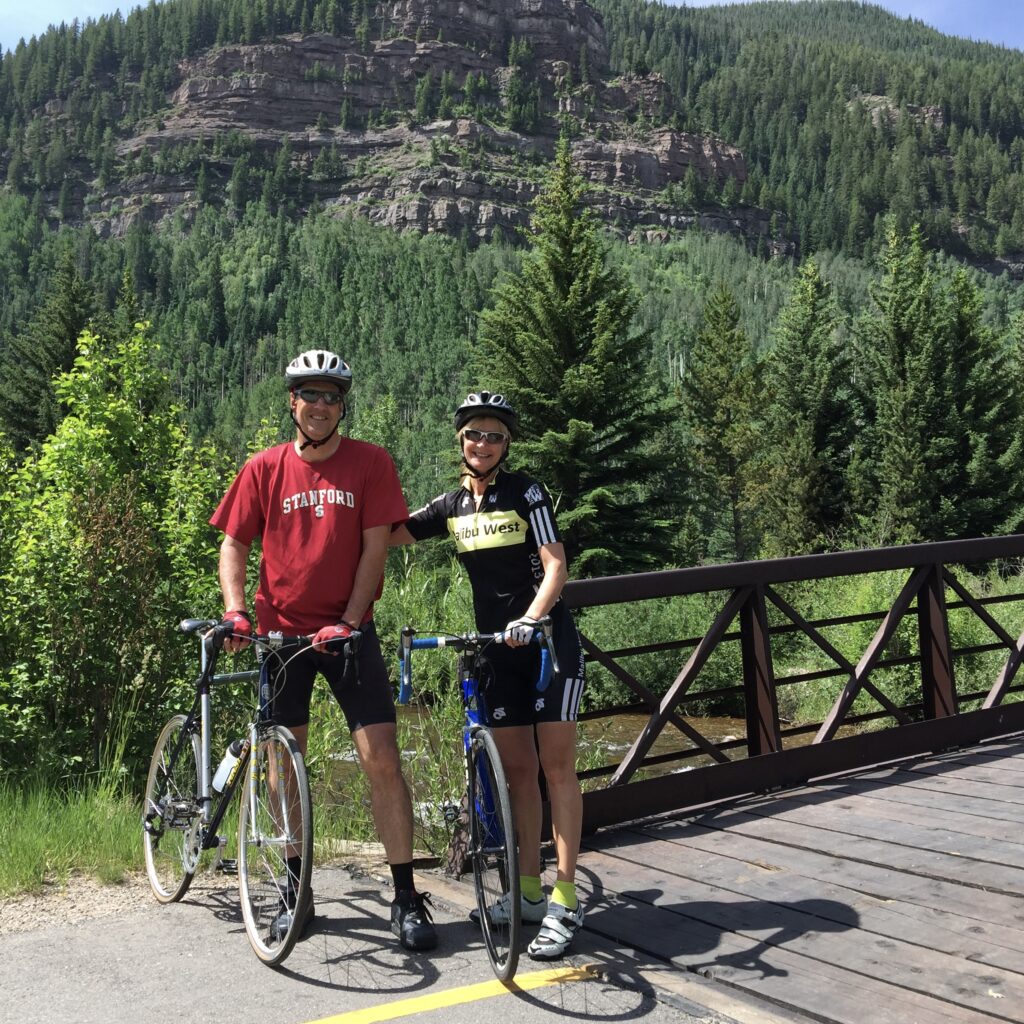September 1, 2023
Helping our Brains to Perceive a Fuller Picture
Ferris Bueller said, “Life moves pretty fast. If you don’t stop and look around once in a while, you could miss it.” He’s right of course, which is why I certainly would have joined the Save Ferris campaign. But maybe Ferris was wrong (gasp!) when it comes to safety and the effort to get better at something. In those cases, we should not be looking around. We should focus intently on the details, because our brains need every bit of information they can get.
On a beautiful summer day in Colorado back in 2015, I was on a bike ride with my brother-in-law Mike and my wife Jill. We were enjoying a well-earned downhill ride, returning from a spectacular journey to the Vail pass. I was leading as we were cruising down the bike path, being careful not to go too fast, when I came upon a fork in the path. I took the left path, then looked back over my shoulder to make sure Jill was doing the same. When I turned around and faced forward, there was a beautiful aspen tree about THREE FEET IN FRONT OF ME. I swerved to barely avoid a head-on collision (good call!), but my shoulder slammed into the tree, throwing me into a cartwheel off the bike. Damn. That’s about as bad a wreck as I’ve had. And I’ve had a few. My friend Ben (he is a doctor, but not the medical kind) has diagnosed me with a rare disease: falloffabikealotus. As I collected my senses, and my brother-in-law observed that I was mostly OK, he said, “I so wish I had my Go-Pro camera going, because that was awesome!” Thanks, Mike.
As I rode home, my hand and wrist started to throb. I’ve suffered through enough broken bones to know what that meant. I went to the Urgent Care center where they confirmed the fracture and casted me up. The young and Colorado-cool doctor asked how it happened. As I was retelling the story, he interrupted me and said, “So, you weren’t paying attention.” I said, “No no no! I was! I was just checking on Jill!” He repeated, strongly, “You were not paying attention. Ninety percent of all of the skiing, biking, and other athletic injuries I treat are caused by people not paying attention. You need to start doing that. You were lucky today.”
That memory came back to me this week as Jill and I watched a NOVA special on the brain called Your Brain: Perception Deception. Here are some of the gems from the NOVA show, which I highly recommend:
- We are only able to take in one percent of our visual field. (One percent! Holy cow!) That’s all of the information our retina and brain are able process together. If you want to test your ability to focus on a task, check out this famous video. (I did poorly the first time I watched it.)
- Because there is so little information, the brain has to piece it together and predict what is going to happen.
- The brain is a predicting machine, doing its best, with that little bit of information, to predict what is going to happen.
“We are only able to take in one percent of our visual field. (One percent! Holy Cow!)”
So if we don’t pay full attention, particularly in times where our safety is at risk, our chances of success are . . . not good. I think John Wooden said it better when he stated, “You will find that success and attention to details, the smallest details, usually go hand in hand.”

Here’s the thing. If our brain sees situations often enough, it becomes a better predictor. When people practice something enough, and when they repeatedly focus on and pay attention to those details, their brain’s predictive abilities in that field get better and better. In addition, repetition and repeated focus help our brains to eventually process way more than that one percent. My friend Steve has entered hundreds of bicycle races over his life. His brain better predicts cycling situations than mine, and he certainly would have avoided my crash. In addition to being able to focus on far more than I can, he would never have turned around to check on anyone, as (1) it’s not a smart or safe thing to do, and (2) it would slow him down. Perhaps not in that order.
I’m fascinated by athletes who say that they are more successful when “the game slows down” for them. Major League Baseball players have 0.4 seconds to figure out whether or not to swing and then how to swing at a pitch. Formula 1 racers are passing other cars at well over 200 MPH, and their lives are at risk if they even slightly misjudge. Musicians are able to move at breakneck speed through certain pieces. How do they do it?
When we begin learning a fast moving or complex activity, our brains can’t process information quickly enough to recognize what we are seeing. With practice and repetition, our brains develop pattern recognition. Our brains develop maps that help us quickly, and for some, almost instantly recognize what’s coming at them. When we focus on the important details, we start to understand the patterns, our brain becomes highly proficient at predicting those patterns, and our brain makes us feel like we can actually “see” fast-moving or highly complex scenes.
And with practice, true experts learn which one percent of information they should focus on. Lawyers know what to give their attention to when sifting through thousands of pages of documents. Teachers can cut through all the activity in a classroom and pay attention to the behaviors that allow them to know how to best impact learning. Athletes pay attention to small cues in their opponents’ actions that let them know what is coming and how to counteract it. With enough repetition, thinkers can develop a sense of automaticity, allowing them to easily perform formerly difficult tasks, and leaving their brain able to focus on different tasks and cues.
So part of it is John Wooden’s advice to observe the smallest details. If you’re lucky, you’ll have a coach like him (well, hold on, there’s no one like John Wooden . . . ), or just a really good coach, to tell you what details to watch. Another part is Malcolm Gladwell’s idea of spending 10,000 hours on something before you become an expert. Whether or not the number is right, the idea is that you can’t “see” patterns unless you’ve paid attention to the details for a long time.
So what are the things I want my brain to better predict? Well for one, I’m going to at least give my brain the full one percent when involved in dangerous activities like driving and cycling. Cell phones do not help in that effort. What else do I want to get better at? Cooking, swimming, golf, guitar, and pickleball, among others. I’m talking about practice. I’m talking about paying attention to the details. I’m talking about enough repetition of doing the right thing, so that my brain can better predict where my paddle should be in pickleball, where my hands should be in the pool, how my golf downswing should feel, and just how much garlic (which is obscenely more than almost every reader here, except maybe my son Ryan) should be put in a dish.
So, yes, pay attention to the details when you want to get better at something, and do it long enough to let the process seem easier and slower for us, but let’s not forget Ferris’s advice. We still have plenty of time to stop and look around this beautiful and highly interesting world of ours, and we should do just that.
To get updates on when my next post comes out, please click here.
Post #90 on www.drmdmatthews.com
—–
Autumn Image by Pexels from Pixabay
Pre-Injury Bike Ride Photo near Vail, CO taken by Mike Orgovan. Photo was not taken with a Go-Pro.
And thanks again to Dr. Eric Olson for his expertise and care, and for being willing to teach me as he was caring for me.

Good morning!
This one is so perfectly timed for me!
FVSD just completed safety training with Knowledge Saves Lives…if you don’t know who they are, “Dude, make it happen. ” At each of our 12 schools/locations, the “coaches” (mostly retired police, fire, and military ba-DASS humans) took us through three hours of empowerment. All staff did the training at their specific site/location. It was active, thought provoking, skill building, mind-set developing, and empowering. Soooo much of what you wrote here underscores the KSL messaging/training. So with your blessing, I may quote you once more…you or maybe Ferris…or NOVA. Thank you!